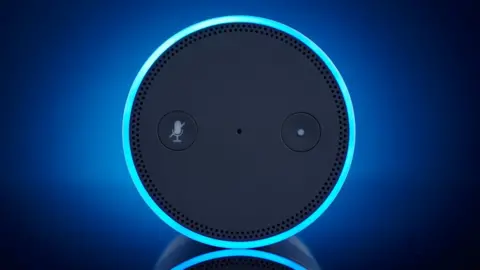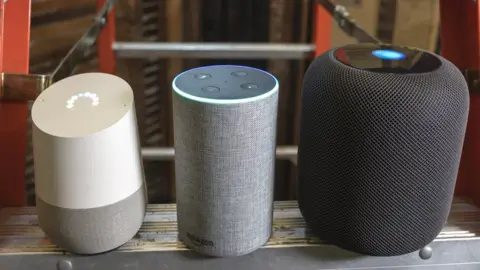Smart speaker recordings reviewed by humans
 Getty Images
Getty ImagesAmazon, Apple and Google all employ staff who listen to customer voice recordings from their smart speakers and voice assistant apps.
News site Bloomberg highlighted the topic after speaking to Amazon staff who "reviewed" Alexa recordings.
All three companies say voice recordings are occasionally reviewed to improve speech recognition.
But the reaction to the Bloomberg article suggests many customers are unaware that humans may be listening.
The news site said it had spoken to seven people who reviewed audio from Amazon Echo smart speakers and the Alexa service.
Reviewers typically transcribed and annotated voice clips to help improve Amazon's speech recognition systems.
Amazon's voice recordings are associated with an account number, the customer's first name and the serial number of the Echo device used.
Some of the reviewers told Bloomberg that they shared amusing voice clips with one another in an internal chat room.
They also described hearing distressing clips such as a potential sexual assault. However, they were told by colleagues that it was not Amazon's job to intervene.
What did Amazon say?
The terms and conditions for Amazon's Alexa service state that voice recordings are used to "answer your questions, fulfil your requests, and improve your experience and our services". Human reviewers are not explicitly mentioned.
In a statement, Amazon said it took security and privacy seriously and only annotated "an extremely small sample of Alexa voice recordings".
"This information helps us train our speech recognition and natural language understanding systems, so Alexa can better understand your requests, and ensure the service works well for everyone," it said in a statement.
"We have strict technical and operational safeguards, and have a zero tolerance policy for the abuse of our system. Employees do not have direct access to information that can identify the person or account as part of this workflow."
What about Apple and Siri?
Apple also has human reviewers who make sure its voice assistant Siri is interpreting requests correctly.
Siri records voice commands given through the iPhone and HomePod smart speaker.
 Getty Images
Getty ImagesAccording to Apple's security policy, voice recordings lack personally identifiable information and are linked to a random ID number, which is reset every time Siri is switched off.
Any voice recordings kept after six months are stored without the random ID number.
Its human reviewers never receive personally identifiable information or the random ID.
What about Google and Assistant?
Google said human reviewers could listen to audio clips from its Assistant, which is embedded in most Android phones and the Home speaker.
It said clips were not associated with personally identifiable information and the company also distorted the audio to disguise the customer's voice.
Are smart speakers recording all my conversations?
A common fear is that smart speakers are secretly recording everything that is said in the home.
While smart speakers are technically always "hearing", they are typically not "listening" to your conversations.
All the major home assistants record and analyse short snippets of audio internally, in order to detect a wake word such as "Alexa", "Ok Google" or "Hey Siri".
If the wake word is not heard, the audio is discarded.
But if the wake word is detected, the audio is kept and recording continues so that the customer's request can be sent to the voice recognition service.
It would be easy to detect if a speaker was continuously sending entire conversations back to a remote server for analysis, and security researchers have not found evidence to suggest this is happening.
Can I stop human reviewers listening to my voice clips?
Amazon's Alexa privacy settings do not let you opt out of voice recording or human review, but you can stop your recordings being used to "help develop new features". You can also listen to and delete previous voice recordings.
Google lets you listen to and delete voice recordings on the My Activity page. You can also switch off "web and app history tracking" and "voice and audio activity", which Google Assistant pesters you to switch on.
Apple does not let you listen back to Siri recordings. Its privacy portal, which lets you download a copy of your personal data, says it cannot provide information "that is not personally identifiable or linked to your Apple ID".
To delete voice recordings created by Siri on an iOS device, go to the Siri & Search menu in Settings and switch Siri off. Then go to the Keyboard menu (found in the General section) and switch off Dictation.
